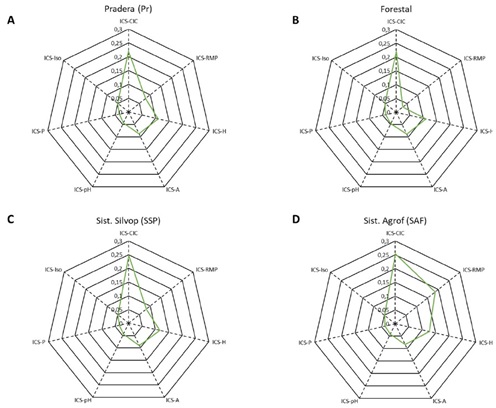Soil Quality Index for Agricultural Systems in the Tropical Dry
DOI:
https://doi.org/10.28940/terra.v41i0.1694Keywords:
agroforestry, soil organic carbon, soil organisms, woody plants, soil propertiesAbstract
In recent decades, food growing demand associated with population growth has led to the transformation of forested areas or natural ecosystems into land for agricultural production. The use of soil quality indices allows a better understanding of soil degradation or improvement level under different agricultural systems, which favors decision-making and the selection of sustainable management practices. Thus, the objective of this research is to evaluate soil quality indices (ICS) in different agricultural systems, as a decision-making strategy for soil conservation and rehabilitation in the Colombian Caribbean region. Four land use systems were selected in the departments of Córdoba, Bolívar, Sucre, Cesar, and Magdalena: commercial forestry (Forestry), traditional livestock pasture (Pr), Agroforestry with Cocoa (SAF) and silvopastoral (SSP) systems. In each land use, the systems were evaluated with soil physical, chemical, and biological variables to calculate ICS. The implementation of SSP increased organic matter accumulation and cation exchange capacity (CEC) in the range from 25 to 29% more than forest monoculture and Pr systems. Soil biological diversity was higher within systems associated with tree species. CIC was the most relevant soil indicator in the soil index construction with a contribution from 34.7 to 41.2% of the ICS total value. The minimum set of selected data was made up of CEC, mechanical resistance to compaction, sand percentage (A), order Isoptera, pH and phosphorus content. The land use system with the highest ICS was SAF (0.77), followed by SSP (0.66). The inclusion of tree species within production systems improves soil quality, increasing soil carbon sequestration by more than 19% within SSP.
Downloads
Publication Facts
Reviewer profiles N/A
Author statements
- Academic society
- Terra Latinoamericana
- Publisher
- Mexican Society of Soil Science, C.A.

















